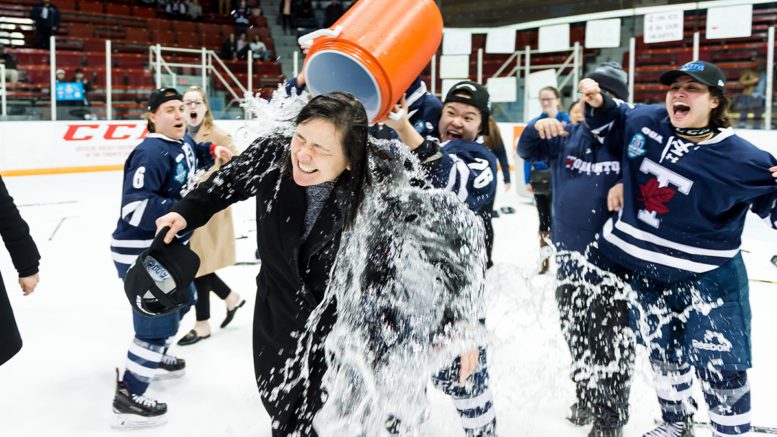Vicky Sunohara has been through this before.
As a two-time Olympic gold medalist in women’s hockey, Sunohara is one of the few in sports who had experienced the cancellation of major sporting events due to a disease, similar to the announcement there will be no university fall season due to the COVID-19 pandemic.
Now the head coach of the University of Toronto Varsity Blues women’s hockey team, she has been able to use her emotions from the 2003 abandonment of the world championships, due to SARS, as a way to help her own players work through not having hockey this autumn.
“So that was probably my first kind of experience, although nothing else here really shut down … it was crushing, I was so disappointed,” said Sunohara, recently over the phone. “I wanted to go so bad. It’s always a big accomplishment to make the team and then to have an opportunity to play in a World Championship.
“I was devastated.”

How to handle that has been a key lesson she has passed on to her players.
“I don’t think there is a trick to it, it’s just being consistent and staying connected and just being sure that we’re keeping contact,” said Sunohara.“There is always support for mental health and that everybody is seeing a strength and conditioning coach, speaking with a therapist for injuries.
“At our school there (are) many resources for mental health support and we all need those at times in our lives.”
For sports that span both the fall and winter season, such as hockey, college coaches across the country are worried about how their athletes will be able to stay in game shape and ready for a possible winter season.
“It presents a few different challenges for us …there’s no, at least in the OUA, there’s going to be no exhibition play,” said Dan Church, head coach of York Lions varsity women’s hockey team. “There is no competition through December 31, I think we’re all incredibly disappointed but understanding.”
Ontario University Athletics and the national body USports simultaneously announced, along with Canada West and Atlantic University Sport there would not be competition in any sports for the rest of 2020.
Quebec’s organization (RSEQ) has not made an announcement as of yet, Church said, partly because it also runs the CEGEP (a style of junior college) and high school systems.
This access to training or lack thereof is especially notable on the Lions, a team with multiple out-of-province players, including seven from Manitoba who the coach says are already able to work out in groups of up to 18.
“Our Manitoban athletes got their equipment and were able to take it home with them, when they departed campus (at the end of last season) … before everything kind of shut down,” said Church. “But the rest of our players, all of their equipment is locked up in our … so they can’t train on the ice right now.”
That does not stop them from working out in whatever way possible at home.
Church and Sunohara, along with Ryan Medel, the head coach of the University of Toronto men’s hockey team, all believe that the COVID-19 pandemic will bring future changes to sports.
“I think it will definitely change for the near future. I think that there’s going to be a lot more awareness of cleanliness (and) disinfecting things,” said Medel. “So, I do think that, you know, for hockey and every sport, there’s going to be much more of an awareness and focus on that.”
Even though most competitive sports are on pause, Church believes that when games fully return, it will bring society together at a time when people need it most.
“Sport is really an important part of building people’s lives. And that’s where we have to keep our focus as opposed to the wins and losses.”

